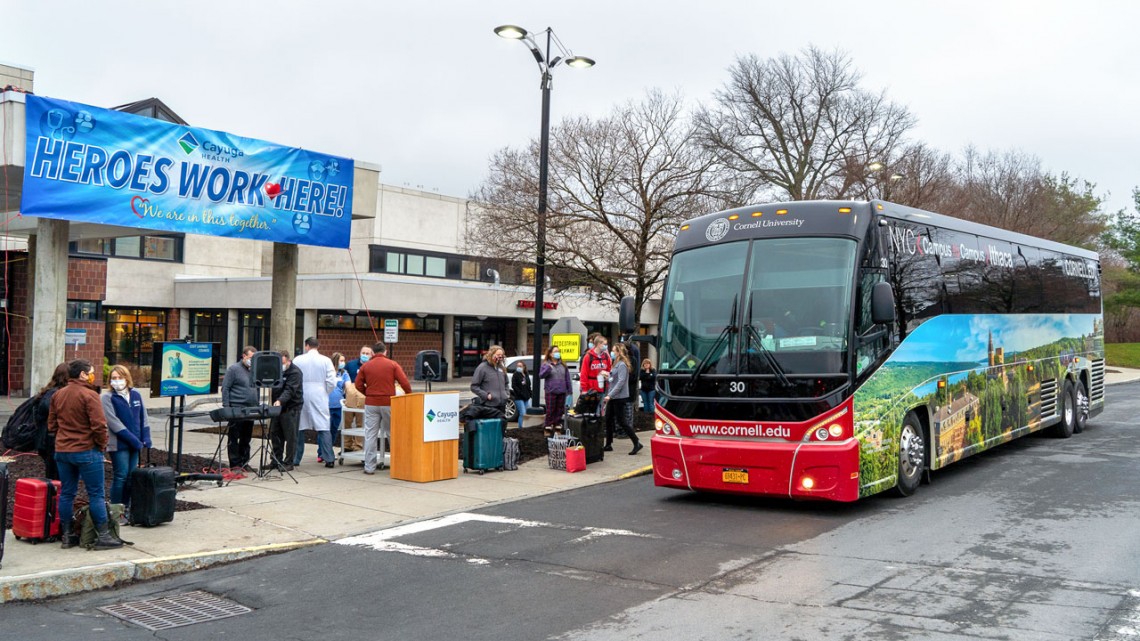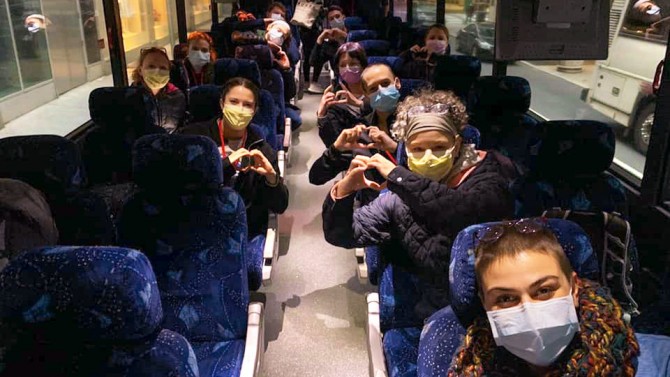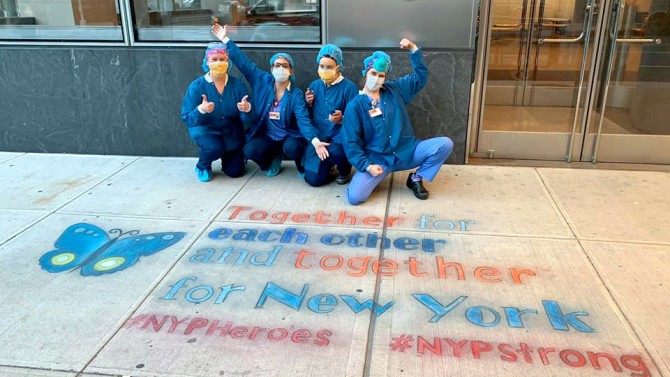
A Campus-to-Campus bus prepares to depart from Cayuga Medical Center on April 8, bound for New York City. Two buses carried medical professionals to New York to help with COVID-19 response at NewYork-Presbyterian/Weill Cornell Medical Center.
‘Connectedness’: Cayuga Health joins COVID-19 fight in NYC
By
More than 50 doctors, nurses and other health care professionals from Cayuga Health in Ithaca have joined their Weill Cornell Medicine and NewYork-Presbyterian/Weill Cornell Medical Center counterparts to care for New Yorkers diagnosed with COVID-19.
The team from Cayuga Health, which operates Cayuga Medical Center in Ithaca, arrived April 8 by Cornell’s Campus-to-Campus bus. Team members have since been receiving on-the-job training in preparation for working in an expanded intensive care unit – one of several that collectively have more than doubled NewYork-Presbyterian’s normal ICU capacity – to care for the sickest patients.
“This sharing of support across Cayuga Health, Weill Cornell Medicine, NewYork-Presbyterian and Cornell’s Ithaca campus exemplifies the connectedness of our communities,” said Cornell President Martha E. Pollack. “On an individual level, it also highlights the commitment of our local health care professionals to the larger New York state community, to their professions and to their patients. Extraordinary times like these often bring out the extraordinary within people, and that is what we are seeing here: a demonstration of humanity and altruism that has been a light in the midst of this pandemic.”
“Our committed physicians and health care staff have been on the front lines since this crisis began, working tirelessly to help heal and return home as many COVID-19 patients as possible,” said Dr. Augustine M.K. Choi, the Stephen and Suzanne Weiss Dean of Weill Cornell Medicine and provost for medical affairs of Cornell University. “This heroic work requires all hands on deck, and we are profoundly grateful to Cayuga Health for its assistance in our hour of need. Together, we can provide New Yorkers with the finest, most compassionate care and bring this pandemic under control.”
“We are extremely proud of our dedicated staff who have shown extraordinary courage, skill and resilience in caring for our patients through this crisis,” said Dr. Steven J. Corwin, president and CEO of NewYork-Presbyterian. “We are deeply grateful to Cayuga Health and to this remarkable team of doctors, nurses and health care professionals for stepping up to help us in this time of need. Their willingness to join our staff on the front lines of this pandemic is truly extraordinary.”
New York state has more COVID-19 cases than any country outside the United States, and New York City is the center of that outbreak and the hardest-hit city in the global crisis, with more than 132,000 confirmed COVID-19 cases and nearly 14,000 deaths and probable virus-related deaths to date. In response, medical teams from around the country have poured into the city to help local hospitals expand their capacity.
The Cayuga Health team was similarly driven to help. Tompkins County has so far been spared the brunt of the COVID-19 outbreak, and with outpatient and elective appointments canceled, the center’s medical team was available to redeploy where the need was greatest.
“Every night our medical staff was going home and watching the news and seeing what was happening in New York City, and realizing that others were in need – whereas in Ithaca, thankfully the burden from the pandemic has been much lighter,” said Dr. Martin Stallone, Cayuga Health CEO, who’s also a clinical instructor in medicine at Weill Cornell Medicine.
The team began discussions, and on April 2 formally suggested a deployment to New York City. Stallone reached out to Gary Koretzky, vice provost for academic integration at Cornell – and formerly one of Stallone’s medical school instructors – with the idea. Working with Pollack, Koretzky – also a professor of medicine at Weill Cornell Medicine who leads collaboration between the university’s Ithaca and New York City campuses – facilitated the conversation with Choi.
A plan took shape 72 hours and a site visit later.
“It seemed a good opportunity for a show of solidarity – and one that could be a real help in this crisis,” Koretzky said. “It was extremely gratifying to help our upstate medical colleagues connect with Weill Cornell Medicine and NewYork-Presbyterian to provide a much-needed service.”
The team – consisting of 12 doctors, 33 nurses and seven nurse-support staff – have made an initial four-week commitment. (Additional health care workers joined the group a few days later.) Paired with teams from Weill Cornell Medicine and NewYork-Presbyterian, the Cayuga Health staff spent several days learning the institutions’ standard practices and protocols. Once acclimated, the Cayuga Health team was assigned to staff an expansion ICU serving approximately 30-50 patients who may need additional care to manage severe pneumonia and other complications.
“We are unfortunately the hottest spot in the world right now for COVID-19, and we’re taking care of a huge number of critically ill patients, far more than we have ever taken care of at one time,” said Dr. Matthew Fink, assistant dean for clinical affairs and chairman of the Department of Neurology at Weill Cornell Medicine, and neurologist-in-chief at NewYork-Presbyterian/Weill Cornell Medical Center. Fink led the teams’ integration.
“We really appreciate the help from the Cayuga Health team,” Fink said, “which will provide invaluable care to our patients and enable our team – who have been working around the clock – to get some rest.”
“We expect this exchange will spark a greater appreciation of the benefits of collaboration across the Cornell University campuses, as well as medical centers across the state,” Choi said. “We are deeply appreciative of President Pollack and Dr. Stallone for their invaluable contributions in this challenging time.”
Jim Schnabel is a freelance writer for Weill Cornell Medicine.
Media Contact
Get Cornell news delivered right to your inbox.
Subscribe


